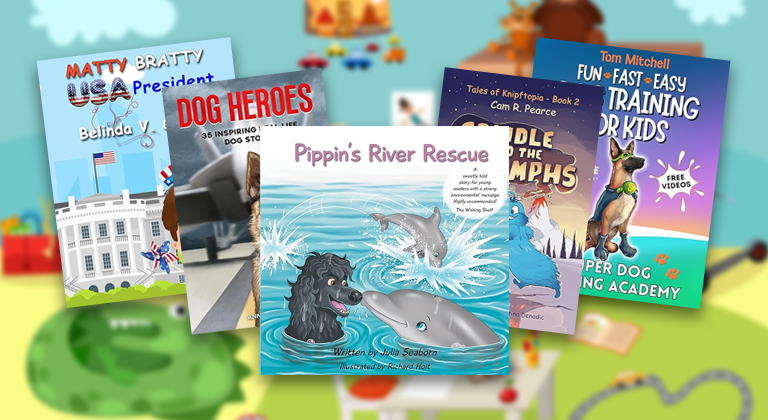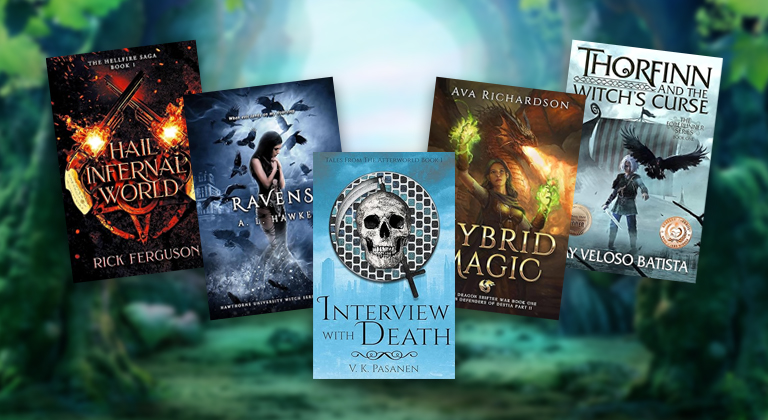Befriend other authors for support and collaboration
I’ve mentioned before that I attribute much of my success as an author to being part of an online writing community where I could ask questions, get support, or just talk to others that were dong the same thing I was doing, and going through the same sort of experiences and challenges. Even though that community is no longer around, I’m still friends with many of those authors, Ginger being one of them. Befriending another author directly is essentially the same thing, the two of you just make up a smaller community, but it’s no less important or beneficial. Just remember that while you might do your writing alone, that doesn’t mean that you’re alone in writing.
Ernest Hemingway once wrote: “Writing, at its best, is a lonely life,” but uncharacteristically, I don’t agree with Papa on this one.
The most successful authors that I know are surrounded by a circle of like-minded writer friends – and although some of those relationships are entirely virtual, I don’t think they’re any less meaningful than the ones we have face-to-face with real friends and family.
The first time I made digital friends with another writer who published at my level, it was like taking a cold drink of water after dragging myself through the desert for months on end. I’d met somebody else who got it! I found it incredibly validating and valuable – and as our friendship continued, both of us became more successful together than either of us could have become alone.
So, if you’re finding yourself stuck in a rut with your writing career, my advice to you is to reach out to another writer and start a conversation. It’s likely any writer whose currently more successful than you are has been in the exact same situation as you’re in now, and would probably offer advice and support (and any writer less successful would appreciate your guidance in how to get to where you’re at now.)
In fact, sometimes simply identifying as a writer – as somebody who hears the same trumpets as the rest of us – positions you to become either mentor or protégé to others who follow on the same, crazy path.
Plus, thanks to social media, it’s never been easier to reach out to other authors – almost all of us have Facebook pages, Instagram Accounts, mailing lists or some other presence on the web. Leaving a comment or sliding into somebody’s DMs and writing “I’m a writer too, I appreciate what you’re putting out there” is often enough to spark a conversation.
It’s worth doing. I know I’ve become a lot more successful (and stayed a hell of a lot saner) thanks to friendships that began this way.
But if you’re looking for some tangible ways to collaborate with another writer, here are some suggestions.
#1 Promote each other’s work
One of the most important things you need to learn about being a writer is that other writers are not our competition. In fact, it’s the opposite. A rising tide lifts all boats, and some of the most valuable relationships I’ve developed with other writers have been because we’ve each championed each other’s work.
As you build a successful self-publishing career, you start to develop a following of fans and supporters – but you have to remember that you’re not the only writer they have a relationship with (“Sniff, I thought what we had was special!”) So, unless you’re churning out a new book every week, it’s doubtful that telling your subscribers, your social media followers, or your friends down at the pub about the latest publication from a writer friend will cost you any sales.
The value of doing this depends on what type of books you write, compared to those of your writing friends. I write romantic suspense novels, for example, so I don’t think including a link to my friend’s vegan recipe book is necessarily going to generate a flood of sales for them – but likewise, it’s probably not going to cause any of my followers to unsubscribe, either.
But as I found out when I promoted the latest book from a writer friend who publishes science-fiction romance, sometimes there is a significant crossover – and with some of my readers churning through 100 romance books a year, they’ll probably have finished that one long before I have a new book in my series coming out to distract them.
My only advice is to limit the number of other authors you regularly promote – remember, people followed you for YOUR writing, not to join a miniature version of the BookBub newsletter promoting a ton of different books.
Likewise, hold your writer friends to your own standards. Ideally, read (or at least skim) any book you’re going to promote, because your readers are trusting you that this book is worthy of your recommendation. You’ll hurt your own reader loyalty if you promote books that aren’t fully edited, or aren’t as well-written as yours, so don’t be afraid to push back if you think your friend’s book needs extra work. In fact, that feedback will probably do more to further their writing career than a single shoutout to your mailing list or social media followers ever could.
Finally, be authentic. If you promote another author’s book, tell your subscribers or followers why. Explain why you’re friends with this author, give a genuine reason why you think their book is worth sharing with your own readers, and be ready to stand up for that opinion if anybody asks. Often “social proof” is one of the key influencers in any buying decision, so a genuine recommendation from you might be the ‘special sauce’ that leads to a purchase of your friend’s book.
#2 Leverage each other’s ARC team
Assuming you and your author friends have some tangible crossover with each other’s readers (my friend who writes science fiction romance, for example – not so much the one with the vegan cookery book) then you can take this relationship a little further.
If you have an Advanced Reading Copy (ARC) group among your readers, for example, then you can work together with another author by offering ARC copies of their book to your readers.
This is a little more involved than simply promoting another writer’s book, and depending on your publishing schedule, it could impact your own plans – but in general I only publish one new book every 3 months or so, so my ARC team isn’t exactly over-taxed getting their reviews up in the first place.
Therefore, it really makes little impact to the number of reviews my new release will get if I offer my ARC team an advanced copy of my friend’s book to review six or seven weeks prior, since they’ll generally be done with it long before then.
That being said, I’ve only worked with one or two authors this way, and because of the value offered through an ARC service (which is why businesses like Hidden Gems exist in the first place) I’d expect it to be a reciprocal arrangement. Amazon has so many rules and regulations regarding posting reviews that I’d only be willing to work with an author I implicitly trust before sharing my ARC team with them, and you should bear that in mind if you approach any of your writer friends about making such an arrangement.
It’s also important to never ever knowingly agree to ‘exchange’ reviews with other authors directly, as this violates Amazon’s terms of service – and they will find out.
Now, obviously, most writers are also readers – so there’s nothing wrong with an author leaving a review of another writer’s book. After all, even Stephen King reviews other writer’s books! However, doing so in a way that could be viewed as an ‘exchange’ very much is viewed as wrong by Amazon.
A few years ago, whole threads on Reddit existed where writers could ‘exchange’ reviews (“You 5-star me and I’ll 5-star you!”) and Amazon cracked down by creating an algorithm which identified authors who left reviews on books written by authors who’d similarly reviewed their books.
It’s not a hard and fast rule and I couldn’t tell you definitively what is and isn’t allowed by Amazon, but I’ve always tried to avoid doing anything with the review process that could be construed as manipulative, and that’s why I’d take working with a ‘proper’ ARC service like Hidden Gems rather than share ARC teams with anyone except the one or two writers I closely trust.
#3 Help each other with the technical (and not-so-technical) stuff
The other day, a writer friend of mine complained about how “Facebook advertising doesn’t work” and I reached out to her via DM. We batted back and forth for a while before I realized that the reason she wasn’t getting traction with her ads was because she needed to generate a more effective audience – so I showed her how!
Later on, she gave me some pointers about how she’d made her mailing list automation so effective, and by exchanging knowledge and helping each other out, we both became better at what we do.
Sometimes, the most valuable thing about being friends with other writers is that you’ll each have pieces to this big jigsaw puzzle that the other is missing; and you can become better by helping each other out.
I used to have a great relationship with another writer who paid me to set up their Facebook account – in beer!
Since I’m a pro at Facebook, my friend trusted I knew what I was doing with his ads, so he was happier to pay me than go through an agency that offered uncertain results.
Meanwhile, I had three kids home all summer long, and my beer money was going on SpongeBob popsicles and slurpees instead of ice-cold Stella Artois (damn you, pandemic!) So a delivery through Drizly really helped me out!
We both got what we needed, and because we were friends, we were able to pay each other in things of much higher value than mere money (i.e. beer.)
#4 Be each other’s “accountability buddy”
I have an earnest belief that anybody can be successful at writing and publishing, and that the thing that most often holds them back isn’t the technical side of things (advertising, formatting, publishing) but life in general.
Becoming friends with another writer is a great way to hold each other accountable to do the things you need to do in order to build a successful writing career. I have a dear friend in the UK who texts me every morning at 4am ET to remind me to #writeeveryday and I’ll ping her a similar text before I go to bed to remind her of the same thing!
I have other friends who I work with to make sure we’re all tracking with the slightly less exciting things about publishing – keeping to our self-imposed deadlines when it comes to editing, publishing, and promoting our books. It’s not very glamorous, but we writers are prone to procrastination and I’ve found that if I didn’t have somebody giving me a nudge, I’d probably push each deadline back further and further. Done is better than perfect, remember?
There’s another benefit to this, though. When you push another writer to commit to the process of self-publishing, you get to share in the excitement of their results. When your friend gets into the Top 100 of their category, or breaks their sales goal with a new release, you’ll get that same dopamine hit as they do, and it can really help both of you ramp things up.
But, more importantly, when they follow the process and are successful, it’s a reminder than you can be successful too if you stick to that process – and that’s the fifth and final way you can collaborate with another author:
#5 Just be there for each other
Writing isn’t like any other business in the world. Writers aren’t like any other people. To me, the magic of developing real-life and online friendships with other writers was that they ‘got it.’ They heard the sound of trumpets, just as I did, and they understood this crazy ambition of mine that left my wife and my friends scratching their heads in confusion.
Just being is often the most valuable support you can offer another writer. Your existence validates theirs. You share challenges, and by working together, hopefully you’ll share in celebrating each other’s success.
You have to remember that writers are the rarest of rare breeds. If you think that there are 3.5 billion English speaking people on the planet today, remember than only 2 million of them have ever written and published a book (that’s a bit of a guess, assuming Amazon is the largest repository of published literature, but when you’re comparing millions to billions it’s as close as you need to get.)
That means simply by self-publishing a single book, you’ve become part of a club that encompasses just 0.006% of English speakers who have ever lived – which explains why your mother-in-law doesn’t understand what it is you do, and nor do 5,999 out of any 6,000 people you’re ever likely to meet.
To be friends with another writer, and to drive each other to greater and greater success, is perhaps the greatest thing you can do to further your writing career. Iron sharpens iron, and similarly writers sharpen each other like a knife to a quill.
Sometimes, the most valuable thing you can do is just be there for somebody who shares your wild ambition to tell stories, share your wisdom, and connect with others through the written word.
Lift them up. Remind them why you’re both doing this – and do what you need to do in order to be more successful, because the better you get, the better they’ll become (and vice versa.)
Writing is a solitary occupation, sure – but we don’t spend 24 hours a day writing (well, not since a coffee-fueled weekend in February 2019.) Invest some of those other hours in not being solitary – and see what magic happens as a result of it.











